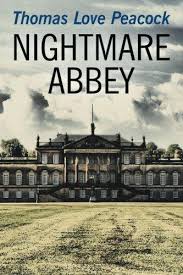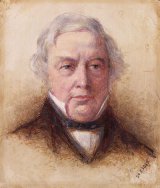Nightmare Abbey Page #13
Nightmare Abbey is an 1818 novella by Thomas Love Peacock, and his third long work of fiction to be published.
Do you, or do you not, know what is the matter with my cousin? MR FLOSKY To say that I do not know, would be to say that I am ignorant of something; and God forbid, that a transcendental metaphysician, who has pure anticipated cognitions of every thing, and carries the whole science of geometry in his head without ever having looked into Euclid, should fall into so empirical an error as to declare himself ignorant of any thing: to say that I do know, would be to pretend to positive and circumstantial knowledge touching present matter of fact, which, when you consider the nature of evidence, and the various lights in which the same thing may be seen-- MARIONETTA I see, Mr Flosky, that either you have no information, or are determined not to impart it; and I beg your pardon for having given you this unnecessary trouble. MR FLOSKY My dear Miss O'Carroll, it would have given me great pleasure to have said any thing that would have given you pleasure; but if any person living could make report of having obtained any information on any subject from Ferdinando Flosky, my transcendental reputation would be ruined for ever. * * * * * CHAPTER IX Scythrop grew every day more reserved, mysterious, and distrait; and gradually lengthened the duration of his diurnal seclusions in his tower. Marionetta thought she perceived in all this very manifest symptoms of a warm love cooling. It was seldom that she found herself alone with him in the morning, and, on these occasions, if she was silent in the hope of his speaking first, not a syllable would he utter; if she spoke to him indirectly, he assented monosyllabically; if she questioned him, his answers were brief, constrained, and evasive. Still, though her spirits were depressed, her playfulness had not so totally forsaken her, but that it illuminated at intervals the gloom of Nightmare Abbey; and if, on any occasion, she observed in Scythrop tokens of unextinguished or returning passion, her love of tormenting her lover immediately got the better both of her grief and her sympathy, though not of her curiosity, which Scythrop seemed determined not to satisfy. This playfulness, however, was in a great measure artificial, and usually vanished with the irritable Strephon, to whose annoyance it had been exerted. The Genius Loci, the tutela of Nightmare Abbey, the spirit of black melancholy, began to set his seal on her pallescent countenance. Scythrop perceived the change, found his tender sympathies awakened, and did his utmost to comfort the afflicted damsel, assuring her that his seeming inattention had only proceeded from his being involved in a profound meditation on a very hopeful scheme for the regeneration of human society. Marionetta called him ungrateful, cruel, cold-hearted, and accompanied her reproaches with many sobs and tears; poor Scythrop growing every moment more soft and submissive--till, at length, he threw himself at her feet, and declared that no competition of beauty, however dazzling, genius, however transcendent, talents, however cultivated, or philosophy, however enlightened, should ever make him renounce his divine Marionetta. 'Competition!' thought Marionetta, and suddenly, with an air of the most freezing indifference, she said, 'You are perfectly at liberty, sir, to do as you please; I beg you will follow your own plans, without any reference to me.' Scythrop was confounded. What was become of all her passion and her tears? Still kneeling, he kissed her hand with rueful timidity, and said, in most pathetic accents, 'Do you not love me, Marionetta?' 'No,' said Marionetta, with a look of cold composure: 'No.' Scythrop still looked up incredulously. 'No, I tell you.' 'Oh! very well, madam,' said Scythrop, rising, 'if that is the case, there are those in the world--' 'To be sure there are, sir;--and do you suppose I do not see through your designs, you ungenerous monster?' 'My designs? Marionetta!' 'Yes, your designs, Scythrop. You have come here to cast me off, and artfully contrive that it should appear to be my doing, and not yours, thinking to quiet your tender conscience with this pitiful stratagem. But do not suppose that you are of so much consequence to me: do not suppose it: you are of no consequence to me at all--none at all: therefore, leave me: I renounce you: leave me; why do you not leave me?' Scythrop endeavoured to remonstrate, but without success. She reiterated her injunctions to him to leave her, till, in the simplicity of his spirit, he was preparing to comply. When he had nearly reached the door, Marionetta said, 'Farewell.' Scythrop looked back. 'Farewell, Scythrop,' she repeated, 'you will never see me again.' 'Never see you again, Marionetta?' 'I shall go from hence to-morrow, perhaps to-day; and before we meet again, one of us will be married, and we might as well be dead, you know, Scythrop.' The sudden change of her voice in the last few words, and the burst of tears that accompanied them, acted like electricity on the tender-hearted youth; and, in another instant, a complete reconciliation was accomplished without the intervention of words. There are, indeed, some learned casuists, who maintain that love has no language, and that all the misunderstandings and dissensions of lovers arise from the fatal habit of employing words on a subject to which words are inapplicable; that love, beginning with looks, that is to say, with the physiognomical expression of congenial mental dispositions, tends through a regular gradation of signs and symbols of affection, to that consummation which is most devoutly to be wished; and that it neither is necessary that there should be, nor probable that there would be, a single word spoken from first to last between two sympathetic spirits, were it not that the arbitrary institutions of society have raised, at every step of this very simple process, so many complicated impediments and barriers in the shape of settlements and ceremonies, parents and guardians, lawyers, Jew-brokers, and parsons, that many an adventurous knight (who, in order to obtain the conquest of the Hesperian fruit, is obliged to fight his way through all these monsters), is either repulsed at the onset, or vanquished before the achievement of his enterprise: and such a quantity of unnatural talking is rendered inevitably necessary through all the stages of the progression, that the tender and volatile spirit of love often takes flight on the pinions of some of the [Greek: epea pteroenta], or winged words which are pressed into his service in despite of himself. At this conjuncture, Mr Glowry entered, and sitting down near them, said, 'I see how it is; and, as we are all sure to be miserable do what we may, there is no need of taking pains to make one another more so; therefore, with God's blessing and mine, there'--joining their hands as he spoke. Scythrop was not exactly prepared for this decisive step; but he could only stammer out, 'Really, sir, you are too good;' and Mr Glowry departed to bring Mr Hilary to ratify the act.
Translation
Translate and read this book in other languages:
Select another language:
- - Select -
- 简体中文 (Chinese - Simplified)
- 繁體中文 (Chinese - Traditional)
- Español (Spanish)
- Esperanto (Esperanto)
- 日本語 (Japanese)
- Português (Portuguese)
- Deutsch (German)
- العربية (Arabic)
- Français (French)
- Русский (Russian)
- ಕನ್ನಡ (Kannada)
- 한국어 (Korean)
- עברית (Hebrew)
- Gaeilge (Irish)
- Українська (Ukrainian)
- اردو (Urdu)
- Magyar (Hungarian)
- मानक हिन्दी (Hindi)
- Indonesia (Indonesian)
- Italiano (Italian)
- தமிழ் (Tamil)
- Türkçe (Turkish)
- తెలుగు (Telugu)
- ภาษาไทย (Thai)
- Tiếng Việt (Vietnamese)
- Čeština (Czech)
- Polski (Polish)
- Bahasa Indonesia (Indonesian)
- Românește (Romanian)
- Nederlands (Dutch)
- Ελληνικά (Greek)
- Latinum (Latin)
- Svenska (Swedish)
- Dansk (Danish)
- Suomi (Finnish)
- فارسی (Persian)
- ייִדיש (Yiddish)
- հայերեն (Armenian)
- Norsk (Norwegian)
- English (English)
Citation
Use the citation below to add this book to your bibliography:
Style:MLAChicagoAPA
"Nightmare Abbey Books." Literature.com. STANDS4 LLC, 2024. Web. 24 Nov. 2024. <https://www.literature.com/book/nightmare_abbey_48>.




Discuss this Nightmare Abbey book with the community:
Report Comment
We're doing our best to make sure our content is useful, accurate and safe.
If by any chance you spot an inappropriate comment while navigating through our website please use this form to let us know, and we'll take care of it shortly.
Attachment
You need to be logged in to favorite.
Log In